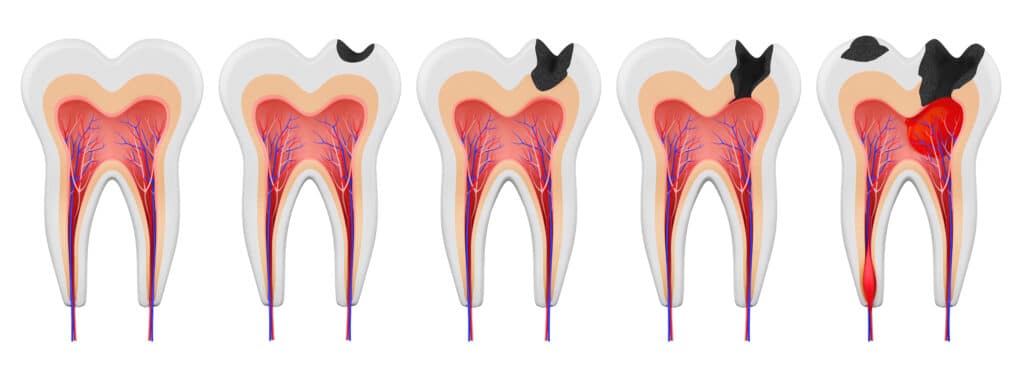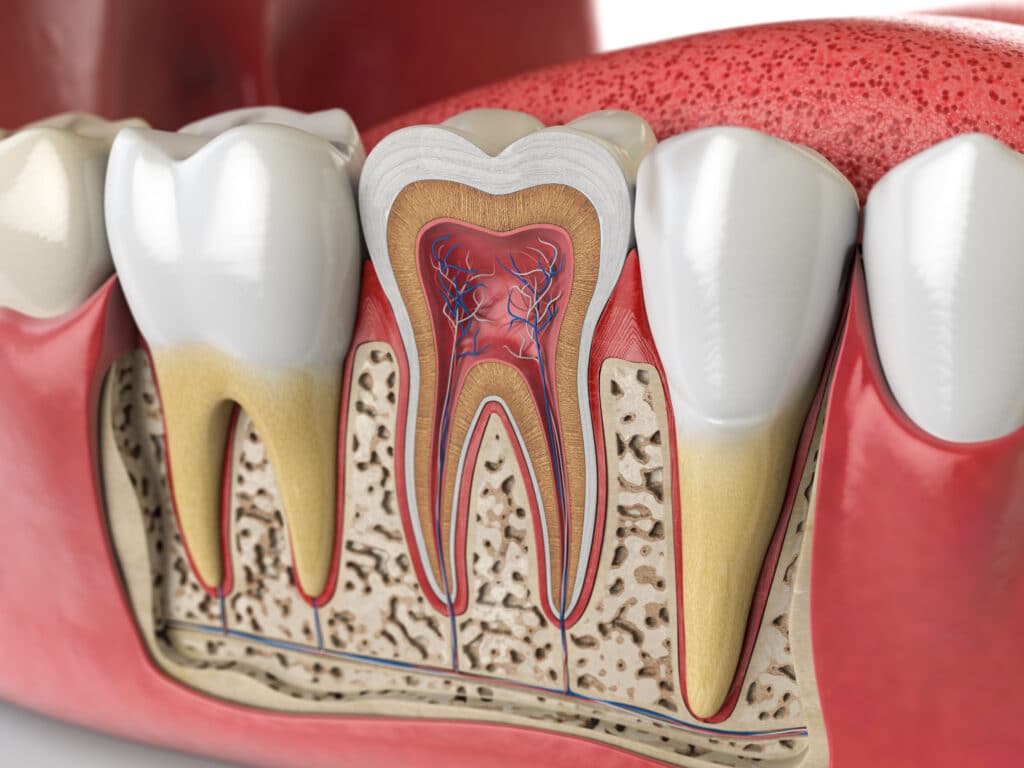
Root Canal Therapy
Commonly called a root canal, root canal therapy is an endodontic procedure to remove inflamed or infected pulp from the inside of the tooth, which is then carefully cleaned and disinfected, then filled and sealed. Root canal treatment is designed to eliminate bacteria from the infected root canal, prevent reinfection of the tooth and save the natural tooth.

What is a Root Canal?
Root canal therapy is a type of endodontic therapy that is often recommended if the tooth pulp and nerves become infected or damaged. This may occur if injury or decay reaches deep into the tooth, past the outer enamel layer and into the inner dentin. When left untreated, this type of infection and disease may cause the pulp and nerve tissue to die. To restore the health of the tooth and avoid the need for extraction, our skilled endodontists will remove the infected and injured tissues from within the tooth, clean the tooth and fill it with a medicated material. Once your root canal treatment is complete, you will return to your general dentist to have a permanent restoration, such as a dental crown, completed.
Reasons for a Root Canal
A root canal is performed when the soft inner part of a tooth, known as the pulp, is injured or becomes inflamed or infected.
Common causes of damage to the pulp include:
- Deep decay due to an untreated cavity
- Multiple dental procedures on the same tooth
- A chip or crack in the tooth
- An injury to the tooth (you might injure a tooth if you get hit in the mouth; the pulp can still be damaged even if the injury doesn’t crack the tooth)


Dr. Randy Simon
Endodontist
“Many dentists recommend a root canal when they notice signs of an infection of the tooth pulp. The only way to save the tooth at this stage is to remove the infected pulp and seal the tooth with a restoration. It is thought to be very painful but is actually a pain-relieving treatment.”
Is a Root Canal painful?
One common concern about this type of treatment is the fear of pain. However, when performed by a trained dental specialist, the procedure should be relatively painless. The pain typically comes from the infection, not the treatment. The treatment itself is designed to alleviate pain.
Local anesthesia is used to numb the tooth and surrounding area, ensuring the procedure is as comfortable as possible. Post-treatment, some tenderness is normal but temporary. Over-the-counter pain medication usually suffices to relieve any discomfort.
What Does Root Canal Therapy Entail?
-
Anesthetic
The dentist will place a small amount of numbing medication on your gum near the affected tooth. Once it has taken effect, a local anesthetic will be injected into your gums. You may feel a sharp pinch or a burning sensation, but this will pass quickly.
You’ll remain awake during the procedure, but the anesthetic will keep you from feeling any pain.
-
Removing the pulp
When your tooth is numb, the endodontist will make a small opening in the top of the tooth. Once the infected or damaged pulp is exposed, the specialist will carefully remove it using special instruments. They’ll be particularly careful to clean out all the pathways (canals) in your tooth.
-
Sealing of the Canal System
Once the canals are cleaned and disinfected, the dentist will fill and seal the root canal system with a sealer and rubber-like material called gutta-percha. They also may prescribe you oral antibiotics if indicated.
-
Temporary filling
The dentist will end the procedure by filling the small opening in the top of the tooth with a soft, temporary material. This sealant helps prevent the canals from being damaged by saliva until you can return to your general dentist for a permanent restoration.
Root Canal Recovery
It’s normal to experience some tenderness and sensitivity around the treated tooth for a few days. Most patients can manage discomfort with over-the-counter pain medications as recommended by their endodontist. It’s important to follow post-procedure care instructions diligently, including maintaining good oral hygiene and avoiding hard or sticky foods initially. Over time, any initial discomfort typically subsides, allowing patients to fully enjoy restored dental health and function. Regular follow-up visits with your dentist ensure the tooth heals properly and remains healthy for years to come.
Why Choose Leading Edge Endodontics for Your Root Canal Therapy?
Root canal treatment has a reputation for being a painful treatment. However, root canal treatment can often be completed with minimal discomfort thanks to advanced techniques, tools and anesthesia. Our endodontists and entire team work hard to provide you with a pleasant and comfortable experience each time you visit our office. To learn more about root canal treatment, we welcome you to contact us today. We are committed to restoring your smile’s health.
Find one of our convenient locations
Contact Us
Fields marked with “*” are required.
"*" indicates required fields
